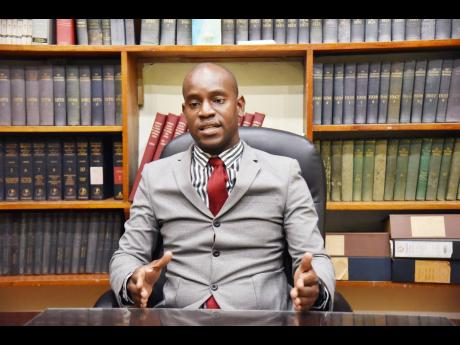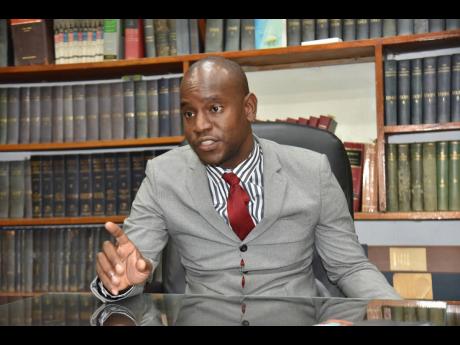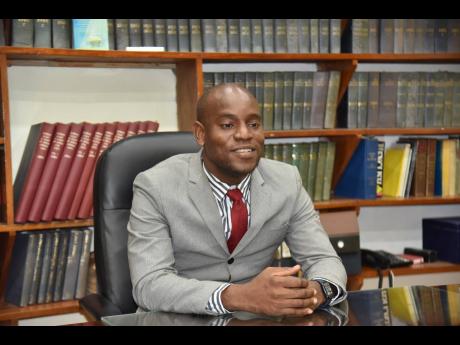Lighting the flames of justice
Attorney-at-law John Clarke has ample reasons to be angry and bear resentment with many different state agencies in Jamaica, especially the police force. Instead, the dedicated lawyer has turned his experience in state care as well as an ugly interaction in 2014 with the police into a passion for justice.
On July 2, 2014, with just two years at the Bar, Clarke was transporting a young lady – the sole witness to the murder of her father allegedly by the police – to her home in St Thomas. As Clarke told it, the young lady was seeking justice on her deceased father’s behalf through assistance from Jamaicans for Justice (JFJ), a formidable human rights body in the country that he was a part of.
The young lady had complained to JFJ that each time she would travel for a hearing, the vehicle she was in would be stopped by the police, who proceeded to search her. She said it happened on numerous occasions.
That day, he decided to take her home, as it was late, and he wanted to allay her fears and show that the stops by the police were random. Except that his car was stopped by the police.
According to the police’s version, Clarke was driving on the Bull Bay main road in St Thomas when he was stopped by the cops. When asked to produce his driver’s licence, he failed to do so. There was an ensuing altercation and a female sergeant was hit after she held on to him. Clarke was taken to the Bull Bay Police Station where he was charged. He was given a November 13, 2014 court date.
Clarke said the police did not request his driver’s licence, which he could not produce then, but had five days in which to do so at the time.
“I always walked with a copy of the Road Traffic Act in the car. So had they asked, I would have told them I had five days in which to do so. I never laid a hand on the policewoman. I did not tell them I was a lawyer, but I was asking them why was I stopped and I wasn’t speeding. Then the charges came. It was after that they found out that I was a lawyer,” he explained.
On that fateful evening when Clarke decided to be a Good Samaritan and take the witness home, his status was changed from defence counsel to defendant. Several persons who knew the young lawyer said he could not hurt a fly. The kicker for them was when the police accused him of being boisterous, raising his voice and assaulting a female officer. They smelled something most unkind and unjust.
ON A MISSION TO FIGHT INJUSTICE
During the sit-down interview with The Sunday Gleaner last week, it was evident that despite his soft-spoken demeanour, John Clarke was on a mission to fight injustice, as his eyes exploded with passion.
But hurt, too, and disappointment were detected as he spoke. The great loss from that case, according to him, was that the young lady – after witnessing the ordeal – was convinced that she was a target of intimidation and harassment by the police because she dared to take them on. She was convinced that she would be killed just like her father.
“The young lady said ‘if you are the lawyer and they can treat you like that, they can kill me and get away with it’. She said she did not want to continue with the case,” he recounted with sadness.
The case was later dismissed.
He believes some of the same police officers in that case are still serving in the force today.
That case would also force him to realise that many innocent persons were incarcerated and many guilty were walking free, and he was determined to do something about that.
“John Clarke is a citizen of Jamaica. A lawyer who, just like any other citizen, wants to see a better and more just Jamaica, and tries to play a role in ensuring that we have justice in our country,” he declared to The Sunday Gleaner.
INJUSTICE IN STATE CARE
Now age 35, John Clarke did not come from a family of means. The young man was rescued by the State after he was abandoned as a child. He was later adopted.
During his time in state care and at school, he survived on the generosity of others, never complaining nor demanding, but learning and appreciating what he had.
He shared that while growing up in several children’s homes, he was among the innocent punished for things others did, being flogged more often than he can count. He believed there had to be a better way to find the guilty, although everyone knew and refused to talk for fear of reprisal. He could not, and did not, understand why all the children were punished for the wrongs of others. It led many, he said, to become part of the problem, deciding that since they were all going to be punished, then they should at least earn it.
According to him, as wards of the State, they were made to feel that they should not complain, but instead be grateful that society was taking care of them. It was something he rejected, but could not fight.
He learnt from then the hard lessons of unfairness and injustice.
Humble, soft-spoken and with the faintest of smiles, Clarke now lives and breathes law and has been at the forefront of some of the most consequential court decisions in his 11 years at the Bar.
For him, the court was the answer to right the wrongs, punish the guilty and set the innocent free … until he saw the outcome of some cases that reminded him of his time growing up in state care.
Lack of access to justice, he said, victimised the poor. Hefty legal fees were also a critical deterrent.
“One thing that troubles me is that there are many vulnerable Jamaicans, and I consider myself a vulnerable Jamaican, where access to justice is dependent on where you fall on the spectrum. It is something that has always troubled me as a child and even to this day, because anytime I see someone being taken advantage of by the system, I say ‘that could be me’,” Clarke said.
“Perhaps if someone didn’t find me, and rescued me, perhaps if I wasn’t adopted by a businesswoman and her family who gave me a lifestyle that I would not have known, when I see a young man in prison and wrongly imprisoned, I said ‘that could have been me’.”
Clarke’s early days at JFJ further cemented his desire for equity in the justice system. His quest has led him to develop extensive and expansive expertise in constitutional, criminal and administrative law.
Clarke is now the chairman of JFJ and co-principal of legal firm Public Law Chambers – offices once occupied by the eminent attorney, Frank Phipps.
With unwavering dedication to the legal profession, Clarke has appeared before the high and low courts, as well as the Privy Council.
NOT HERE TO BRING DOWN GOVERNMENT
In 2020, Clarke, along with Sasheeka Richards and Isat Buchanan, filed writs of habeas corpus in the Supreme Court on behalf of five individuals detained under the public states of emergencies (SOE). Justice Bertram Morrison ruled that their detention was unlawful, unconstitutional and without justification.
The Government appealed the decision and lost.
It is unclear if the matter is headed to the Privy Council, but Clarke is serving notice that he will be ready. However, it is likely that taxpayers will have to foot the bill to compensate scores of such young men who were detained under the SOEs.
Over the years, JFJ has received significant legal declarations by the courts on behalf of clients whose constitutional rights were breached.
“I am not on any quest to bring down any government. I could not care less who forms the government. If any party which forms the government is pursuing any mandate that is likely to cause injustice to the ordinary Jamaican citizen, then that party should seriously view, I believe, what it considers to be important,” Clarke stated, dismissing detractors who view his work as trying to embarrass the Government.
“Every single prime minister, government minister, government official, takes an oath to uphold the country’s Constitution. If a government is doing something contrary to the Constitution, then that government ought to properly examine itself and ensure that the action it takes is consistent with the Constitution.”
Clarke said he had bought into the SOE “propaganda” re the early arguments and the case made for detaining persons until he began speaking with some detainees, who would later become clients. He said he found many instances of abuse.
“Even if we said crime was going down because they were detained, at what expense? If we are to say we are going to stop corruption by detaining everybody in Gordon House, I am sure nobody there would agree as nobody wants to be detained. Until it comes to your home where your liberty is being affected, then it’s not a problem,” he argued.
PROBLEMS OF THE SYSTEM
“One of the main issues, concerns we have right now is the delays in hearing appeals. The criminal justice system has never received the same level of funding that the Ministry of National Security and police receive. If you look at the budgets, they are miles apart. So we have always increased the budget for the police and say they need the most modern equipment, vast expansion of resources, but yet the justice system has not always received the same resources,” he suggested.
Under the legal aid system, where the State provides lawyers for individuals who are unable to pay for private services, he said the total fee paid to lawyers who take such cases is equivalent to that paid to some defence lawyers for a single day’s court appearance, no matter how long the case lasts.
Clarke said he was aware that some individuals represented by legal aid lawyers did not see their representative until the day of the trial.
Lawyers who take legal aid cases, “are they really doing public service, because many just simply refuse because they take up too much time?” he asked.
He said some accused may plead guilty, as the earlier a case is disposed, the quicker lawyers will be paid. However, it can take between three months to a year for payment to be made.
AN EFFECTIVE LAW REFORM COMMISSION
For Clarke, if he could effect one change it would be the creation of an effective law reform commission, properly resourced with retired and active judges, lecturers, and other experts drawn for a broad cross section of society. That body would be able to conduct proper research, provide position papers, and make binding recommendations to enact changes to the system to bring it fully current.
Clarke is also bothered by the many prisoners in the system who have not been convicted of any crime but who remain incarcerated for decades. The case of George Williams who was released after 50 years without a trial and offered $6 million in compensation from the State, after an initial $3 million, is one such instance.
A law reform commission, he said, would make binding recommendations to government where such matters arise.
How important is justice to a country’s progress? It is a question Clarke and several colleagues try to answer each day as they examine the uniqueness of the cases before them.
But one thing he knows: he would die smiling knowing he helped to bring equity to his country via the justice system.



